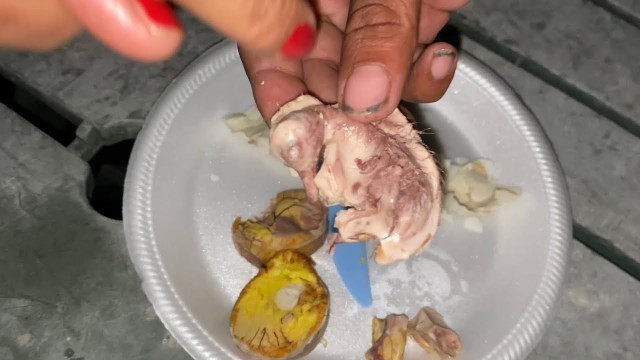

13:08
Jun 18, 2022
0
0
'LALLYs channel https://youtube.com/channel/UCWWUvpgQbZkejNUwKyDqUrQ Balut (/bəˈluːt/ bə-LOOT, /ˈbɑːluːt/ BAH-loot;[1] also spelled as balot) is a Filipino term for a fertilized developing egg embryo that is boiled and eaten from the shell. It is commonly sold as street food in China and other Southeast Asian countries: notably Cambodia (where it is called \"ពងទាកូន\") and Vietnam (where it is called trứng vịt lộn). Duck eggs are larger than chicken eggs, with a larger yolk-to-white ratio that makes them ideal for baked goods. Golden in color and rich in flavor, baked goods made with duck eggs tend to be moist and fluffy, rise better, and hold their shape well. Duck eggs are preferred over chicken eggs for cream and custard fillings because they contain less water and more fat. You can cook duck eggs just like chicken eggs and will find that they have a creamier, richer taste. Some people prefer them deviled or in omelets or quiches, as they have a stronger flavor than chicken eggs when eaten plain. Health Benefits However you serve them, duck eggs are an excellent source of nutrition. Their dark yellow yolk indicates that they hold more antioxidants, more omega-3 fatty acids, and 50% more vitamin A than chicken eggs. Build Muscle Duck eggs offer more protein than chicken eggs, even taking size into consideration. Protein can help you build lean muscle, maintain a healthy weight, and recover after exercise or injury. CONTINUE READING BELOW Support Mental Health Deficiencies in zinc, magnesium, and selenium have been linked to depression and fatigue. Eggs contain all three of these minerals. Duck eggs are an excellent source of selenium, providing almost half of the daily value in one egg. Duck eggs also provide vitamin D, the “sunshine vitamin.” Low levels of vitamin D are associated with depression and seasonal affective disorder. Boost Skin Health Recent studies have shown that B vitamins may improve skin health. There are eight B vitamins, each with their own unique benefit for the skin, and duck eggs contain them all: Vitamin B1, the “anti-stress vitamin,” can help prevent stress-related breakouts. Vitamin B2 helps maintain collagen and reduce inflammation. Vitamin B3 can help with acne, eczema, and dermatitis. Vitamin B5 holds moisture in the skin. Vitamin B6 aids the body in coping with stress, and getting enough sleep, preventing inflammation and dry skin. Vitamin B7 protects the skin from infection and maintains skin moisture. Vitamin B9 promotes cell regeneration, the process by which the body is continuously replacing dead skin cells with new ones. Vitamin B12 reduces acne, dryness, and inflammation. CONTINUE READING BELOW Nutrition Duck eggs contain all vitamins except vitamin C. They also contain all essential trace elements, including iron, copper, and manganese. Nutrients per Serving One duck egg contains: Calories: 130 Protein: 9 grams Fat: 10 grams Carbohydrates: 1 gram Fiber: 0 grams Sugar: 1 gram Portion Sizes The higher yolk content of duck eggs means they have more fat and cholesterol than chicken eggs. If you have heart disease or diabetes, consider limiting the number of egg yolks you eat to about three per week. Egg whites are much lower in cholesterol and saturated fat. How to Use Duck Eggs Cooking with duck eggs is much like working with chicken eggs, but you need to adjust the number of eggs used in the recipe. If you have a food scale, weigh out enough beaten duck egg to equal the amount of chicken egg called for in the recipe. (A large chicken egg weighs 2 ounces.) If you don’t have a food scale, use three duck eggs to equal four chicken eggs. Like chicken eggs, duck eggs keep up to 5 weeks in the fridge. The shell of duck eggs is thicker than chicken eggs,'See also:


















comments